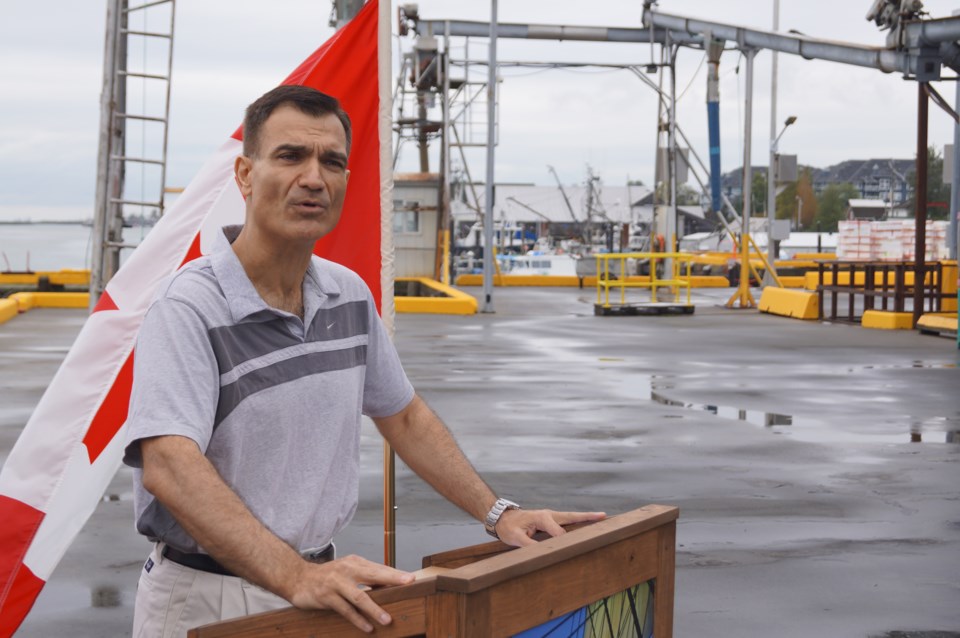Steveston-Richmond East Member of Parliament Joe Peschisolido says he’s prepared to take action on Port of Vancouver’s alleged ambiguous governance structure and abdication of national economic and environmental objectives that has made bedfellows of local environmentalists and Mayor Malcolm Brodie, among others.
“I just don’t think they are doing what is in their jurisdiction to do,” Peschisolido told a group of Richmond and Delta residents at a town hall he hosted in Steveston, Sept. 12.
The federal Liberal politician believes the Government of Canada has lost its ability to steer port-related policy on the West Coast.
This, contends Peschisolido, has led to the arms-length federal entity Vancouver Fraser Port Authority, otherwise branded Port of Vancouver (and formerly Port Metro Vancouver), overstepping its mandate, which is overseen by a board of directors that is largely chosen by government (eight of 11 members) on the recommendations of industry.
“A port does not create public policy. Public policy is created through the people of the elected representatives and a port is a landlord and they make money for the community by having leases for private enterprise that gets stuff in and out. Full stop; that is the function of the port.
“What’s occurred is there’s a hands-off relationship with the board of directors, so in effect the management team calls the shots, which can be good or bad depending on your perspective, because there are those who think the Port of Vancouver is doing a good job. I’m not one of those,” said Peschisolido.
Responding to Peschisolido’s comments, Port of Vancouver spokesperson Danielle Jang said the board meets six times a year but management is delegated to port CEO Robin Silvester.
Annually the port makes over 200 “environmental determinations” under the 2012 Canadian Environmental Assessment Act, ergo, “it would not be practical for the board to be involved in all those decisions,” said Jang.
Since federal environmental checks and balances were weakened in 2012 under Prime Minister Stephen Harper, environmentalists have charged that a series of industrial projects along the Fraser River Estuary — ranging from coal shipments, a new jet fuel terminal and pipeline, LNG terminal expansion and a new container terminal — have failed to be reviewed substantively for their cumulative effects, including climate change, by the federal government.
“The port assesses projects it’s going to build; those that are on its land that it will then profit from,” said community activist Otto Langer, a retired Department of Fisheries and Oceans (DFO) fish biologist.
“I’ve never seen a greater conflict of interest in my whole life.”
Jang said “the port authority employs a team of environmental scientists, community and aboriginal affairs specialists, and professional planners to lead coordinated reviews of proposed projects.”
Another speaker at last month’s event told Peschisolido the port needs more transparent decision making.
Likewise, Brodie has long-taken aim at the board, alleging it has refused to meet with municipalities over farm development concerns.
In August, he said the board once again refused an opportunity to meet. Only one of the 11 board members is appointed by elected municipal representatives.
“I agree with [the] analysis,” said Peschisolido.
“I believe there should be an overhaul. As we say colloquially, you blow it up and start again.
“The Government of Canada and Minister of Transport has instituted a review of the process,” he added.
Langer said the Liberals are stalling on meaningful changes.
But while Peschisolido said he was concerned about the port’s environmental mandate, his main argument against the port continues to be its institutional bias.
Essentially, the port is trying to expand at the expense of national, economic interests, said Peschisolido.
For instance, the port has failed to take meaningful action on handing over container traffic to inland ports, such as at Ashcroft.
“Every major port in the world, best practices in the world, never unloads the stuff in the metropolitan area. Why? It doesn’t make economic sense,” said Peschisolido.
“Land in that area is worth a whole lot more and there are alternative economic activities for that land. So you go inland.”
Peschisolido also noted the port’s proclivity to buy and develop local farmland is questionable in light of such options.
“If that process were to develop naturally, you’d have a slough of inland ports. But you have a board, seekers of rent, that is artificially using their position as a port authority to disrupt where things will go. And they talk about free markets but it’s crock,” said Peschisolido.
“The mandate of a port is to be efficient . . . If you do a pure, free market analysis of the port they don’t do that. They’re rent seekers in that they use their position of power to do things that wouldn’t otherwise occur.”
In another example, Peschisolido said Prince Rupert’s port should be expanded as containers transiting from Asia to America’s East Coast save a day and a half going through the north, via rail.
“If you allowed things to evolve naturally . . . economically it makes sense to go through Prince Rupert.
“The board of Port of Vancouver would disagree. And I argue that’s because they want [containers] in their territory,” he said.
The port’s Jang countered both ports, Vancouver and Prince Rupert, need to grow and there are supply-chain considerations as to why the port seeks more containers.



